Postscript
Rereading the pages that follow, I realised there were many things I would have written differently today, not so much at the level of fact, but certainly of tone. For while my diagnosis remains roughly the same, my state of mind has undoubtedly changed. That ‘Arab despair’ which I describe at length, I was experiencing it myself; I certainly did not relate to the suicidal and regressive reactions which that despair had triggered; and although I hoped for some kind of democratic uprising, I did not believe it would come so quickly. After pondering at length whether I should alter the text in the light of recent facts, I decided not to do so — or only very little. It seemed to me that, in both its analysis and its tone, this essay represents a faithful image of the state of mind which led to the spectacular events we have witnessed, and that it might provide a useful perspective for understanding what happened and what could still happen. I therefore chose not to make too many changes and have limited any substantial additions to the Preface to the English Edition and the Afterword.
Preface to the Original Edition
We have embarked on this century without a compass.
From its very first months, disturbing events took place which created the impression that the world had gone seriously off course in several areas at once — it had gone off course intellectually, financially, environmentally, geopolitically and ethically.
It is true that from time to time upheavals occur which bring unexpected benefits. At such times we may begin to believe that when humanity gets itself into an impasse, it will inevitably find its way out by some miracle. But soon after, other kinds of turbulence come along which reveal quite different human impulses — darker, more familiar ones — prompting one to wonder if our species has reached its threshold of moral incompetence, and whether humanity is still advancing, or has in fact gone into reverse, threatening to undermine all that countless previous generations worked to build.
To avoid any misunderstanding, let me emphasise that I am not one of those people who want nothing to do with the modern world. I am fascinated by what our age has to offer. I eagerly await the latest inventions and am quick to adopt them. I am conscious of belonging to a generation that is highly privileged compared to every previous one, if only by dint of advances in medicine and information technology. But I cannot calmly enjoy the benefits of modernity if I am uncertain that generations to come will be able to enjoy them just as much.
Are these fears disproportionate? Sadly, I don’t think so. In fact, they strike me as fully justified, as I will try to show in this book. I shall do so not in order to accumulate a mass of evidence, nor to defend my belief out of vanity but simply so that my cry of alarm is heard. My main aim is to find a way to persuade my contemporaries, my travelling companions, that the ship we find ourselves aboard has gone adrift. It is off course. It has no destination and no compass, and it is hard to see the way ahead on a stormy sea. Emergency action is required if we are to avoid shipwreck. It is no longer enough to stick to our current course, for better or worse, somehow navigating by sight, avoiding obstacles as they rear up and leaving it to time. Time is not on our side; it is our judge, and a suspended sentence has already been pronounced.
If maritime images come to mind spontaneously, perhaps I should first make my fears explicit with this simple, clear assessment: at the present point in our evolution, humanity faces new dangers never before encountered in our history. They call for unprecedented global solutions. If they are not found in the near future, it will not be possible to save any of the things which give our civilisation its greatness and beauty. Yet to date there are few indications that provide reason to hope that humanity will be able to overcome its differences, devise imaginative solutions and put them into effect. There are many signs that suggest that the world is so severely out of joint that decline will be hard to prevent.
In the pages that follow, I shall not treat each different form of disorder systematically or as a separate case study. My approach will rather be that of a nightwatchman in a garden in the small hours after a storm when another more violent storm looms on the horizon. With his lantern, this man carefully picks his way, shining its beam first on one flower bed, then another, exploring one path, then retracing his steps and bending over to inspect an old uprooted tree. Then he makes for a promontory, puts out his light and tries to take in the whole scene.
He is neither botanist, nor crop specialist, nor landscape gardener, and nothing in the garden belongs to him personally. But this is where he lives with people he cares about, and everything which might affect this land matters greatly to him.
When the Berlin Wall fell, a hopeful breeze blew across the world. The end of the stand-off between the West and the Soviet Union removed the threat of a nuclear cataclysm which had hung over our heads for forty years. We believed that democracy would now gradually spread until it encompassed the whole planet; the barriers between countries would fall; the movement of people, goods, images and ideas would develop unimpeded, ushering in an era of progress and prosperity. On each of these fronts there were some remarkable advances to begin with. But the further we went, the more disorientated we became.
An example of this confusion is the European Union. For the EU, the disintegration of the Soviet bloc was a triumph. One of the two paths offered to the continent’s peoples had turned out to be a dead end, while the other opened onto new horizons. All the former countries of the East came knocking at the EU’s door, and those which were turned away still dream of being admitted. And yet, at the very moment of its triumph, when so many peoples were gravitating towards it in a kind of dazed fascination as though it were an earthly paradise, Europe lost its bearings. What was it supposed to be a union of ? And what was its purpose? Who should it exclude and on what grounds? Now more than ever, the EU is questioning its identity, its borders, its future institutions, its place in the world. And it is not clear what the answers are.
If the EU understands perfectly well how it came into being and is aware of the tragedies which convinced its peoples of the need to unite, it is less clear about the direction it should take from here. Should it set itself up as a federation akin to the United States of America, inspired by a continent-wide patriotism which will transcend and absorb those of its constituent nations? Should it possess not only economic and diplomatic power on the world stage, but also political and military power? Would the EU be ready to take on such a role, and the responsibilities and sacrifices that go along with it? Or should it be content with being a flexible partnership between nations which jealously guard their own sovereignty and playing a supporting role as a global power?
For as long as the continent was divided into two rival camps, dilemmas such as these were irrelevant. Since then, they have become obsessive. Of course, there will be no return to the era of European wars and no new Iron Curtain. But it would be wrong to believe that these questions are just quarrels between politicians or among political scientists. The very destiny of the continent is at stake.
I shall come back to this question in more detail later, as I believe it is an essential one and not just for the people of Europe. I wanted to mention it here as an example of the loss of direction, the sense of disorientation and disorder which affects humanity as a whole and all of its constituent parts.
Читать дальше












